Blogs
Toenail Care for the Elderly
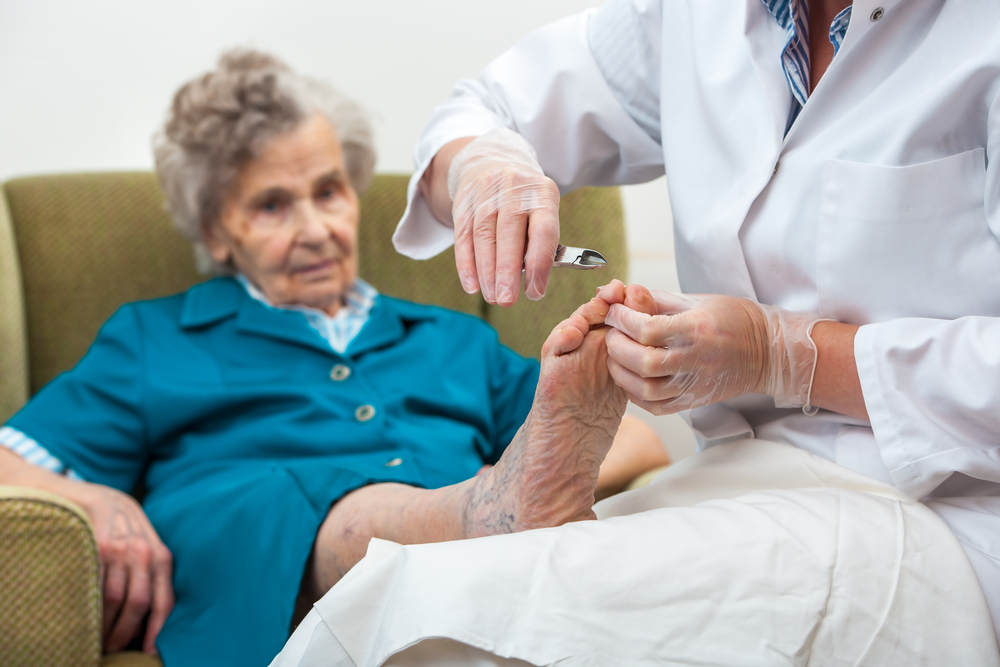 Geriatric (elderly) people may be prone to foot problems, which may include ingrown toenails, corns, and calluses. A reason for this may be their inability to cut their own toenails due to poor eyesight or loss of mobility. A qualified caregiver should be able to cut toenails properly. Ideally, toenails should be kept short, as more problems tend to arise if the nails are too long. The shorter they are, the less risk there is of breaking a nail. As we age, it’s beneficial to stay healthy and active. However, it’s important to remember to practice proper foot care. A podiatrist should be consulted to learn the best options for correct maintenance and treatments.
Geriatric (elderly) people may be prone to foot problems, which may include ingrown toenails, corns, and calluses. A reason for this may be their inability to cut their own toenails due to poor eyesight or loss of mobility. A qualified caregiver should be able to cut toenails properly. Ideally, toenails should be kept short, as more problems tend to arise if the nails are too long. The shorter they are, the less risk there is of breaking a nail. As we age, it’s beneficial to stay healthy and active. However, it’s important to remember to practice proper foot care. A podiatrist should be consulted to learn the best options for correct maintenance and treatments.
If you need your feet checked, contact one of our podiatrists of Carolina Foot & Ankle. Our doctors will attend to all of your foot and ankle needs and provide you with quality treatment.
Geriatrics and Podiatry
When people age, some common issues that may occur are bone density loss, dry skin, poor circulation, and rough brittle nails. These issues may also affect your foot health if the necessary steps are not taken to alleviate the problems.
It is important to take care of your feet because feet that are injured or diseased can affect your overall health. Having painful feet hinders your ability to do daily activities or may decrease your willingness to do the things that you need to do.
Visiting Your Geriatrician
As we age, health problems become more likely, so it is essential to visit your doctor for check-ups to ensure that you are doing the best you can to take care of your health. It is recommended to check your feet frequently for any possible cuts, bruises, swelling, corns or any other irregularities.
Taking Care of Elderly Feet
Cracked or dry feet can be treated by applying moisturizer often. It is also important not to wear old socks because the older the sock is, the higher the possibility there will be that there is bacteria there. Wear fresh socks and make sure they fit properly.
Proper foot health means that you can have a more active lifestyle and you will not be bogged down by pain. Foot health also leads to good circulation, which is paramount for overall health.
If you have any questions, please feel free to contact one of our offices located in Huntersville Office | 16419 Northcross Dr Suite A, Huntersville, NC 28078; Mooresvillle Office | 206 Joe Knox Avenue Suite D, Mooresville, NC 28117; and Mountain Island | 10310 Couloak Drive Suite 200, Charlotte, NC 28216 . We offer the newest diagnostic tools and technology to treat your foot and ankle needs.
Causes of Flat Feet
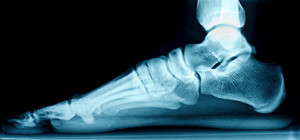 Flat feet, also known as fallen arches, is a common condition in infants, and typically disappears by age three as the foot grows. In adults, this condition can be caused by illness or injury. Being overweight can also be a contributing factor. Therefore, a change in diet may help alleviate symptoms of the condition. Sometimes flat feet are caused by a short Achilles tendon, resulting in pain. A rare cause can be if bones become fused together. When the tendon that connects the inside of the ankle to the calf muscle is injured, flat feet may occur. While flat feet are common, it is a good idea to consult with a podiatrist to avoid any potential complications.
Flat feet, also known as fallen arches, is a common condition in infants, and typically disappears by age three as the foot grows. In adults, this condition can be caused by illness or injury. Being overweight can also be a contributing factor. Therefore, a change in diet may help alleviate symptoms of the condition. Sometimes flat feet are caused by a short Achilles tendon, resulting in pain. A rare cause can be if bones become fused together. When the tendon that connects the inside of the ankle to the calf muscle is injured, flat feet may occur. While flat feet are common, it is a good idea to consult with a podiatrist to avoid any potential complications.
Flatfoot is a condition many people suffer from. If you have flat feet, contact one of our podiatrists from Carolina Foot & Ankle. Our doctors will treat your foot and ankle needs.
What Are Flat Feet?
Flatfoot is a condition in which the arch of the foot is depressed and the sole of the foot is almost completely in contact with the ground. About 20-30% of the population generally has flat feet because their arches never formed during growth.
Conditions & Problems:
Having flat feet makes it difficult to run or walk because of the stress placed on the ankles.
Alignment – The general alignment of your legs can be disrupted, because the ankles move inward which can cause major discomfort.
Knees – If you have complications with your knees, flat feet can be a contributor to arthritis in that area.
Symptoms
- Pain around the heel or arch area
- Trouble standing on the tip toe
- Swelling around the inside of the ankle
- Flat look to one or both feet
- Having your shoes feel uneven when worn
Treatment
If you are experiencing pain and stress on the foot you may weaken the posterior tibial tendon, which runs around the inside of the ankle.
If you have any questions please feel free to contact one of our offices located in Huntersville Office | 16419 Northcross Dr Suite A, Huntersville, NC 28078; Mooresvillle Office | 206 Joe Knox Avenue Suite D, Mooresville, NC 28117; and Mountain Island | 10310 Couloak Drive Suite 200, Charlotte, NC 28216 . We offer the newest diagnostic and treatment technologies for all your foot and ankle needs.
Finding the Right Pair of Shoes For You
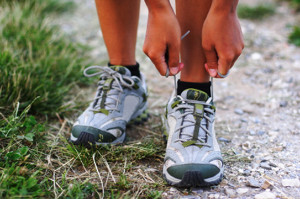 When it comes to shopping for running shoes, there is no perfect shoe that works for everyone. Everyone has a different foot type so just because you’re the same size as someone else, it doesn’t mean their shoe will fit you correctly. Higher prices or brand names also don’t guarantee a great shoe either. There are certain qualities to look for when shoe shopping though. Shoes should be comfortable, especially for long periods of time. Knowing your foot type, such as whether you overpronate or have a neutral foot, can help as well. A podiatrist can help determine your foot type and can also make recommendations about what shoes to wear. A good pair of shoes should provide enough space for your toes, be breathable and comfortable, and support your feet.
When it comes to shopping for running shoes, there is no perfect shoe that works for everyone. Everyone has a different foot type so just because you’re the same size as someone else, it doesn’t mean their shoe will fit you correctly. Higher prices or brand names also don’t guarantee a great shoe either. There are certain qualities to look for when shoe shopping though. Shoes should be comfortable, especially for long periods of time. Knowing your foot type, such as whether you overpronate or have a neutral foot, can help as well. A podiatrist can help determine your foot type and can also make recommendations about what shoes to wear. A good pair of shoes should provide enough space for your toes, be breathable and comfortable, and support your feet.
If you are a runner, wearing the right running shoe is essential. For more information, contact one of our podiatrists from Carolina Foot & Ankle. Our doctors can provide the care you need to keep you pain-free and on your feet.
Choosing the Right Running Shoe for Your Foot Type
To increase performance and avoid the risk of injury, it is important to choose the right running shoe based on your foot type. The general design of running shoes revolves around pronation, which is how the ankle rolls from outside to inside when the foot strikes the ground.
- Neutral runners are able to choose from a wide variety of shoes, including minimalist shoes or even going barefoot.
- Runners who overpronate, or experience an over-abundance of ankle rolling, should choose shoes that provide extra motion control and stability.
- Runners who underpronate, or supinate, have feet that have high arches and lack flexibility, preventing shock absorption. They require shoes with more flexibility and cushion.
If you have any questions please feel free to contact one of our offices located in Huntersville Office | 16419 Northcross Dr Suite A, Huntersville, NC 28078; Mooresvillle Office | 206 Joe Knox Avenue Suite D, Mooresville, NC 28117; and Mountain Island | 10310 Couloak Drive Suite 200, Charlotte, NC 28216 . We offer the newest diagnostic and treatment technologies for all your foot and ankle needs.
New Study Says That Aging Slows Reaction to Falls
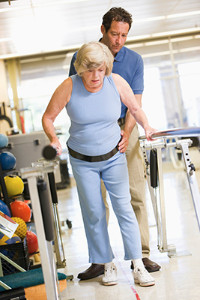 A new study by the University of Waterloo says that the elderly need up to twice as long as young adults to realize they are falling. Seniors are already at an increased risk of falling due to a number of reasons. This study helps show that once they are falling, they don’t process it as quickly as a younger person would. Consequently, there are more times that seniors can’t react fast enough to catch themselves or brace for impact. Falls are a leading cause of hospitalization among the elderly. Studies like this and increased awareness are needed to help prevent future falls among this rapidly growing group of people.
A new study by the University of Waterloo says that the elderly need up to twice as long as young adults to realize they are falling. Seniors are already at an increased risk of falling due to a number of reasons. This study helps show that once they are falling, they don’t process it as quickly as a younger person would. Consequently, there are more times that seniors can’t react fast enough to catch themselves or brace for impact. Falls are a leading cause of hospitalization among the elderly. Studies like this and increased awareness are needed to help prevent future falls among this rapidly growing group of people.
Preventing falls among the elderly is very important. If you are older and have fallen or fear that you are prone to falling, consult with one of our podiatrists from Carolina Foot & Ankle. Our doctors will assess your condition and provide you with quality advice and care.
Every 11 seconds, an elderly American is being treated in an emergency room for a fall related injury. Falls are the leading cause of head and hip injuries for those 65 and older. Due to decreases in strength, balance, senses, and lack of awareness, elderly persons are very susceptible to falling. Thankfully, there are a number of things older persons can do to prevent falls.
How to Prevent Falls
Some effective methods that older persons can do to prevent falls include:
- Enrolling in strength and balance exercise program to increase balance and strength
- Periodically having your sight and hearing checked
- Discuss any medications you have with a doctor to see if it increases the risk of falling
- Clearing the house of falling hazards and installing devices like grab bars and railings
- Utilizing a walker or cane
- Wearing shoes that provide good support and cushioning
- Talking to family members about falling and increasing awareness
Falling can be a traumatic and embarrassing experience for elderly persons; this can make them less willing to leave the house, and less willing to talk to someone about their fears of falling. Doing such things, however, will increase the likelihood of tripping or losing one’s balance. Knowing the causes of falling and how to prevent them is the best way to mitigate the risk of serious injury.
If you have any questions, please feel free to contact one of our offices located in Huntersville Office | 16419 Northcross Dr Suite A, Huntersville, NC 28078; Mooresvillle Office | 206 Joe Knox Avenue Suite D, Mooresville, NC 28117; and Mountain Island | 10310 Couloak Drive Suite 200, Charlotte, NC 28216 . We offer the newest diagnostic and treatment technologies for all your foot care needs.
New Study Seeks Ways to Prevent Stress Fractures
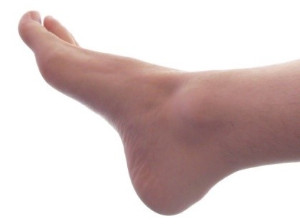 A new study conducted by the University of Oregon, and with the participation of Stanford University, the University of Southern California, and the University of Colorado Boulder, seeks to identify athletes who are likely to develop stress fractures. With newly known risk factor indicators available, athletes who are at risk for stress fractures can be alerted and allowed to rest to prevent them. Stress fractures, or tiny hairline fractures in the bone, most commonly occur from overuse and lack of rest. The study is still in its early stages and will take several years to produce conclusive results. Researchers are hopeful that this will help prevent athlete's injuring themselves and allow them to keep playing.
A new study conducted by the University of Oregon, and with the participation of Stanford University, the University of Southern California, and the University of Colorado Boulder, seeks to identify athletes who are likely to develop stress fractures. With newly known risk factor indicators available, athletes who are at risk for stress fractures can be alerted and allowed to rest to prevent them. Stress fractures, or tiny hairline fractures in the bone, most commonly occur from overuse and lack of rest. The study is still in its early stages and will take several years to produce conclusive results. Researchers are hopeful that this will help prevent athlete's injuring themselves and allow them to keep playing.
Activities where too much pressure is put on the feet can cause stress fractures. To learn more, contact one of our podiatrists from Carolina Foot & Ankle. Our doctors can provide the care you need to keep your pain free and on your feet.
Dealing with Stress Fractures of the Foot and Ankle
Stress fractures occur in the foot and ankle when muscles in these areas weaken from too much or too little use. The feet and ankles then lose support when walking or running from the impact of the ground. Since there is no protection, the bones receive the full impact of each step. Stress on the feet can cause cracks to form in the bones, thus creating stress fractures.
What Are Stress Fractures?
Stress fractures occur frequently in individuals whose daily activities cause great impact on the feet and ankles. Stress factors are most common among:
- Runners
- People affected with Osteoporosis
- Tennis or basketball players
- Gymnasts
- High impact workouts
Symptoms
Pain from the fractures occur in the area of the fractures and can be constant or intermittent. It will often cause sharp or dull pain with swelling and tenderness. Engaging in any kind of activity which involves high impact will aggravate pain.
If you have any questions please feel free to contact one of our offices located in Huntersville Office | 16419 Northcross Dr Suite A, Huntersville, NC 28078; Mooresvillle Office | 206 Joe Knox Avenue Suite D, Mooresville, NC 28117; and Mountain Island | 10310 Couloak Drive Suite 200, Charlotte, NC 28216 . We offer the newest diagnostic and treatment technologies for all your foot and ankle needs.
Common Foot Issues to Look Out For
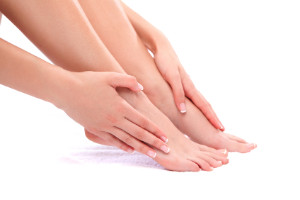 There are a great number of common foot ailments that can affect anyone. Here’s a small rundown on each and what to do about them. Plantar fasciitis, a common form of heel pain, is caused by the inflammation of the plantar fascia and generally occurs from overuse. Rest and wearing good footwear can help the pain go away, however, it is best to see a podiatrist for treatment. Flat feet are often treated by a podiatrist who can offer the best forms of appropriate treatment such as custom-made orthotics. Heel spurs are calcium deposits that form beneath the heel bones, potentially causing severe pain. Anti-inflammatory medications, exercise, and orthotics can help treat heel spurs; however, surgery may be necessary in some cases. Calluses, or thick patches of skin caused by friction, can be taken care of by eliminating sources of friction against the foot and moisturizing. For athletes and runners, spraining and straining the foot are always a possibility. Icing the foot, rest, and seeing a podiatrist are the best methods of treatment. Bunions are bony protrusions at the base of the big toe and can be exacerbated by poor footwear, such as heels. Once again, seeing a podiatrist is the best way to get treatment. Finally, ingrown toenails are a common condition and can be prevented by cutting your nails straight across and wearing shoes that give the toes ample space to move.
There are a great number of common foot ailments that can affect anyone. Here’s a small rundown on each and what to do about them. Plantar fasciitis, a common form of heel pain, is caused by the inflammation of the plantar fascia and generally occurs from overuse. Rest and wearing good footwear can help the pain go away, however, it is best to see a podiatrist for treatment. Flat feet are often treated by a podiatrist who can offer the best forms of appropriate treatment such as custom-made orthotics. Heel spurs are calcium deposits that form beneath the heel bones, potentially causing severe pain. Anti-inflammatory medications, exercise, and orthotics can help treat heel spurs; however, surgery may be necessary in some cases. Calluses, or thick patches of skin caused by friction, can be taken care of by eliminating sources of friction against the foot and moisturizing. For athletes and runners, spraining and straining the foot are always a possibility. Icing the foot, rest, and seeing a podiatrist are the best methods of treatment. Bunions are bony protrusions at the base of the big toe and can be exacerbated by poor footwear, such as heels. Once again, seeing a podiatrist is the best way to get treatment. Finally, ingrown toenails are a common condition and can be prevented by cutting your nails straight across and wearing shoes that give the toes ample space to move.
Everyday foot care is very important to prevent infection and other foot ailments. If you need your feet checked, contact one of our podiatrists from Carolina Foot & Ankle. Our doctors can provide the care you need to keep you pain-free and on your feet.
Everyday Foot Care
Often, people take care of their bodies, face and hair more so than they do for their feet. But the feet are a very important aspect of our bodies, and one that we should pay more attention to. Without our feet, we would not be able to perform most daily tasks.
It is best to check your feet regularly to make sure there are no new bruises or cuts that you may not have noticed before. For dry feet, moisturizer can easily be a remedy and can be applied as often as necessary to the affected areas. Wearing shoes that fit well can also help you maintain good foot health, as well as making it easier to walk and do daily activities without the stress or pain of ill-fitting shoes, high heels, or even flip flops. Wearing clean socks with closed shoes is important to ensure that sweat and bacteria do not accumulate within the shoe. Clean socks help to prevent Athlete’s foot, fungi problems, bad odors, and can absorb sweat.
If you have any questions please feel free to contact one of our offices located in Huntersville Office | 16419 Northcross Dr Suite A, Huntersville, NC 28078; Mooresvillle Office | 206 Joe Knox Avenue Suite D, Mooresville, NC 28117; and Mountain Island | 10310 Couloak Drive Suite 200, Charlotte, NC 28216 . We offer the newest diagnostic and treatment technologies for all your foot and ankle needs.
What to Do About Foot Pain
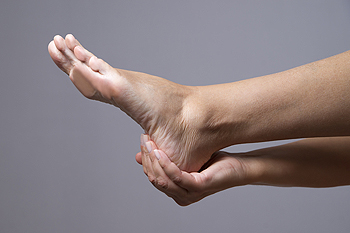 Foot pain can be a very debilitating condition to experience. First, however, it is important to figure out what is causing it. Plantar fasciitis is one of the most common causes of heel pain. Standing for long periods of time and overuse can cause the plantar fascia to become inflamed. Plantar fasciitis can affect anyone. Thankfully there are a number of treatments available for heel pain, with many of them being very easy to do. Keeping pressure off the feet, resting, and avoiding overuse can improve the condition of many who suffer from plantar fasciitis. Another method for treating heel pain includes buying a new pair of well-fitted shoes. Look for a pair that is not too tight or loose for your feet. Shoes should also have enough space in the toe box for your toes to wiggle around. Finally, look for a pair that is comfortable and that would be fine to wear for long periods of time. If you have heel or general foot pain that will not go away, see a podiatrist for a diagnosis and proper treatment.
Foot pain can be a very debilitating condition to experience. First, however, it is important to figure out what is causing it. Plantar fasciitis is one of the most common causes of heel pain. Standing for long periods of time and overuse can cause the plantar fascia to become inflamed. Plantar fasciitis can affect anyone. Thankfully there are a number of treatments available for heel pain, with many of them being very easy to do. Keeping pressure off the feet, resting, and avoiding overuse can improve the condition of many who suffer from plantar fasciitis. Another method for treating heel pain includes buying a new pair of well-fitted shoes. Look for a pair that is not too tight or loose for your feet. Shoes should also have enough space in the toe box for your toes to wiggle around. Finally, look for a pair that is comfortable and that would be fine to wear for long periods of time. If you have heel or general foot pain that will not go away, see a podiatrist for a diagnosis and proper treatment.
Many people suffer from bouts of heel pain. For more information, contact one of our podiatrists of Carolina Foot & Ankle. Our doctors can provide the care you need to keep you pain-free and on your feet.
Causes of Heel Pain
Heel pain is often associated with plantar fasciitis. The plantar fascia is a band of tissues that extends along the bottom of the foot. A rip or tear in this ligament can cause inflammation of the tissue.
Achilles tendonitis is another cause of heel pain. Inflammation of the Achilles tendon will cause pain from fractures and muscle tearing. Lack of flexibility is also another symptom.
Heel spurs are another cause of pain. When the tissues of the plantar fascia undergo a great deal of stress, it can lead to ligament separation from the heel bone, causing heel spurs.
Why Might Heel Pain Occur?
- Wearing ill-fitting shoes
- Wearing non-supportive shoes
- Weight change
- Excessive running
Treatments
Heel pain should be treated as soon as possible for immediate results. Keeping your feet in a stress-free environment will help. If you suffer from Achilles tendonitis or plantar fasciitis, applying ice will reduce the swelling. Stretching before an exercise like running will help the muscles. Using all these tips will help make heel pain a condition of the past.
If you have any questions please contact one of our offices located in Huntersville Office | 16419 Northcross Dr Suite A, Huntersville, NC 28078; Mooresvillle Office | 206 Joe Knox Avenue Suite D, Mooresville, NC 28117; and Mountain Island | 10310 Couloak Drive Suite 200, Charlotte, NC 28216 . We offer the newest diagnostic and treatment technologies for all your foot and ankle needs.
Everything to Know About Plantar Fasciitis
 Many people who suffer from foot pain are diagnosed with plantar fasciitis, but what is it? Plantar fasciitis is the inflammation of the plantar fascia ligament in the heel. Symptoms consist of a stabbing or burning pain in the heel, which tends to worsen from overuse. Thankfully, it is a condition that can be treated. Typical causes of plantar fasciitis include repetitive movements from athletic activities, flat feet, obesity, age, and poor footwear. If you think you suffer from plantar fasciitis, see a podiatrist for a diagnosis. Treatment can include a simple change in footwear, orthotics, keeping pressure off the foot, and corticosteroids. Plantar fasciitis can be painful, but it is treatable with proper care.
Many people who suffer from foot pain are diagnosed with plantar fasciitis, but what is it? Plantar fasciitis is the inflammation of the plantar fascia ligament in the heel. Symptoms consist of a stabbing or burning pain in the heel, which tends to worsen from overuse. Thankfully, it is a condition that can be treated. Typical causes of plantar fasciitis include repetitive movements from athletic activities, flat feet, obesity, age, and poor footwear. If you think you suffer from plantar fasciitis, see a podiatrist for a diagnosis. Treatment can include a simple change in footwear, orthotics, keeping pressure off the foot, and corticosteroids. Plantar fasciitis can be painful, but it is treatable with proper care.
Plantar fasciitis can be very painful and inconvenient. If you are experiencing heel pain or symptoms of plantar fasciitis, contact one of our podiatrists from Carolina Foot & Ankle. Our doctors can provide the care you need to keep you pain-free and on your feet.
What Is Plantar Fasciitis?
Plantar fasciitis is the inflammation of the thick band of tissue that runs along the bottom of your foot, known as the plantar fascia, and causes mild to severe heel pain.
What Causes Plantar Fasciitis?
- Excessive running
- Non-supportive shoes
- Overpronation
- Repeated stretching and tearing of the plantar fascia
How Can It Be Treated?
- Conservative measures – anti-inflammatories, ice packs, stretching exercises, physical therapy, orthotic devices
- Shockwave therapy – sound waves are sent to the affected area to facilitate healing and are usually used for chronic cases of plantar fasciitis
- Surgery – usually only used as a last resort when all else fails. The plantar fascia can be surgically detached from the heel
While very treatable, plantar fasciitis is definitely not something that should be ignored. Especially in severe cases, speaking to your doctor right away is highly recommended to avoid complications and severe heel pain. Your podiatrist can work with you to provide the appropriate treatment options tailored to your condition.
If you have any questions please feel free to contact one of our offices located in Huntersville Office | 16419 Northcross Dr Suite A, Huntersville, NC 28078; Mooresvillle Office | 206 Joe Knox Avenue Suite D, Mooresville, NC 28117; and Mountain Island | 10310 Couloak Drive Suite 200, Charlotte, NC 28216 . We offer the newest diagnostic and treatment technologies for all your foot and ankle needs.
Diabetes and Foot Care
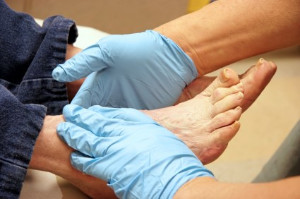 While the relationship between diabetes and the feet may not seem important to most people, it is of the utmost concern. Diabetics generally suffer from poor blood circulation and neuropathy, or nerve loss. Due to the loss of sensation associated with neuropathy, diabetics may not realize when they have a foot ulcer. The wound may also become infected due to the poor blood circulation and improper healing. Amputations are not uncommon because of diabetes, and awareness of this issue is vital to those who have the condition. Diabetics should inspect their feet daily for wounds, splinters, or any abnormalities. If you have diabetes, avoid going barefoot and wear well-cushioned footwear that provides optimal foot support and wiggle room for the toes. Finally, it is highly recommended to see a podiatrist for a foot examination at least once a year.
While the relationship between diabetes and the feet may not seem important to most people, it is of the utmost concern. Diabetics generally suffer from poor blood circulation and neuropathy, or nerve loss. Due to the loss of sensation associated with neuropathy, diabetics may not realize when they have a foot ulcer. The wound may also become infected due to the poor blood circulation and improper healing. Amputations are not uncommon because of diabetes, and awareness of this issue is vital to those who have the condition. Diabetics should inspect their feet daily for wounds, splinters, or any abnormalities. If you have diabetes, avoid going barefoot and wear well-cushioned footwear that provides optimal foot support and wiggle room for the toes. Finally, it is highly recommended to see a podiatrist for a foot examination at least once a year.
Diabetic foot care is important in preventing foot ailments such as ulcers. If you are suffering from diabetes or have any other concerns about your feet, contact one of our podiatrists from Carolina Foot & Ankle. Our doctors can provide the care you need to keep you pain-free and on your feet.
Diabetic Foot Care
Diabetes affects millions of people every year. The condition can damage blood vessels in many parts of the body, especially the feet. Because of this, taking care of your feet is essential if you have diabetes, and having a podiatrist help monitor your foot health is highly recommended.
The Importance of Caring for Your Feet
- Routinely inspect your feet for bruises or sores.
- Wear socks that fit your feet comfortably.
- Wear comfortable shoes that provide adequate support.
Patients with diabetes should have their doctor monitor their blood levels, as blood sugar levels play such a huge role in diabetic care. Monitoring these levels on a regular basis is highly advised.
It is always best to inform your healthcare professional of any concerns you may have regarding your feet, especially for diabetic patients. Early treatment and routine foot examinations are keys to maintaining proper health, especially because severe complications can arise if proper treatment is not applied.
If you have any questions please feel free to contact one of our offices located in Huntersville Office | 16419 Northcross Dr Suite A, Huntersville, NC 28078; Mooresvillle Office | 206 Joe Knox Avenue Suite D, Mooresville, NC 28117; and Mountain Island | 10310 Couloak Drive Suite 200, Charlotte, NC 28216 . We offer the newest diagnostic and treatment technologies for all your foot and ankle needs.
Preventing Foot Injuries for the Active Elderly
 Compared to younger athletes, elderly athletes are more likely to suffer a foot injury as they get older. Foot conditions and injuries that affect all ages include plantar fasciitis, ankle sprains, stress fractures, and Morton’s neuroma. While the sport one plays can vary, there are certain things that athletes of all ages can do to prevent foot injuries. Wearing an ankle brace can help prevent sprains, while quality footwear can prevent foot pain. Proper arch support can be the difference between comfort and discomfort. Custom orthotics may be necessary for some people who have flat or unsupported feet. Stretching is vital, and everyone should stretch not only before an activity but after as well. Finally, keeping your feet dry by changing socks and using foot powder can prevent conditions like athlete’s foot. If you are an elderly athlete, be sure to see a podiatrist to see if certain activities are right for you.
Compared to younger athletes, elderly athletes are more likely to suffer a foot injury as they get older. Foot conditions and injuries that affect all ages include plantar fasciitis, ankle sprains, stress fractures, and Morton’s neuroma. While the sport one plays can vary, there are certain things that athletes of all ages can do to prevent foot injuries. Wearing an ankle brace can help prevent sprains, while quality footwear can prevent foot pain. Proper arch support can be the difference between comfort and discomfort. Custom orthotics may be necessary for some people who have flat or unsupported feet. Stretching is vital, and everyone should stretch not only before an activity but after as well. Finally, keeping your feet dry by changing socks and using foot powder can prevent conditions like athlete’s foot. If you are an elderly athlete, be sure to see a podiatrist to see if certain activities are right for you.
Proper foot care is something many older adults forget to consider. If you have any concerns about your feet and ankles, contact one of our podiatrists from Carolina Foot & Ankle. Our doctors can provide the care you need to keep you pain-free and on your feet.
The Elderly and Their Feet
As we age we start to notice many changes in our body, but the elder population may not notice them right away. Medical conditions may prevent the elderly to take notice of their foot health right away. Poor vision is a lead contributor to not taking action for the elderly.
Common Conditions
- Neuropathy – can reduce feeling in the feet and can hide many life-threatening medical conditions.
- Reduced flexibility – prevents the ability of proper toenail trimming, and foot cleaning. If left untreated, it may lead to further medical issues.
- Foot sores – amongst the older population can be serious before they are discovered. Some of the problematic conditions they may face are:
- Gouging toenails affecting nearby toe
- Shoes that don’t fit properly
- Pressure sores
- Loss of circulation in legs & feet
- Edema & swelling of feet and ankles
Susceptible Infections
Diabetes and poor circulation can cause general loss of sensitivity over the years, turning a simple cut into a serious issue.
If you have any questions please feel free to contact one of our offices located in Huntersville Office | 16419 Northcross Dr Suite A, Huntersville, NC 28078; Mooresvillle Office | 206 Joe Knox Avenue Suite D, Mooresville, NC 28117; and Mountain Island | 10310 Couloak Drive Suite 200, Charlotte, NC 28216 . We offer the newest diagnostic and treatment technologies for all your foot and ankle needs.
More...
Buying Shoes For Children
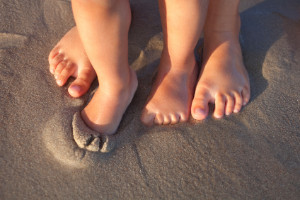 While buying shoes for children can be tough, it is important. Children’s feet are still developing and growing, and their shoes have to reflect this. It’s a good idea to measure a child’s foot before buying shoes. When they try on the shoe, check to see if they can wiggle their toes around. If they can’t, look for shoes that are either longer or wider. Even after buying a pair of shoes, it is recommended to keep measuring them every few months to see if they still fit. Children’s feet grow quickly, and their shoes can be subject to more wear than those of adults. Consequently, replacing shoes every few months may not be uncommon.
While buying shoes for children can be tough, it is important. Children’s feet are still developing and growing, and their shoes have to reflect this. It’s a good idea to measure a child’s foot before buying shoes. When they try on the shoe, check to see if they can wiggle their toes around. If they can’t, look for shoes that are either longer or wider. Even after buying a pair of shoes, it is recommended to keep measuring them every few months to see if they still fit. Children’s feet grow quickly, and their shoes can be subject to more wear than those of adults. Consequently, replacing shoes every few months may not be uncommon.
Making sure that your children maintain good foot health is very important as they grow. If you have any questions, contact one of our podiatrists of Carolina Foot & Ankle. Our doctors can provide the care you need to keep you pain-free and on your feet.
Keeping Children's Feet Healthy
Having healthy feet during childhood can help prevent medical problems later in life, namely in the back and legs. As children grow, their feet require different types of care. Here are some things to consider...
Although babies do not walk yet, it is still very important to take care of their feet.
Avoid putting tight shoes or socks on his or her feet.
Allow the baby to stretch and kick his or her feet to feel comfortable.
As a toddler, kids are now on the move and begin to develop differently. At this age, toddlers are getting a feel for walking, so don’t be alarmed if your toddler is unsteady or ‘walks funny’.
As your child gets older, it is important to teach them how to take care of their feet.
Show them proper hygiene to prevent infections such as fungus.
Be watchful for any pain or injury.
Have all injuries checked by a doctor as soon as possible.
Comfortable, protective shoes should always be worn, especially at play.
If you have any questions please feel free to contact one of our offices located in Huntersville Office | 16419 Northcross Dr Suite A, Huntersville, NC 28078; Mooresvillle Office | 206 Joe Knox Avenue Suite D, Mooresville, NC 28117; and Mountain Island | 10310 Couloak Drive Suite 200, Charlotte, NC 28216 . We offer the newest diagnostic and treatment technologies for all your foot and ankle needs.
Potential New Treatment for Morton’s Neuroma
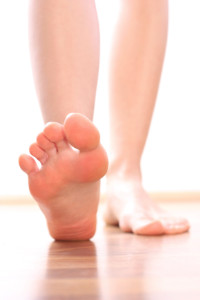 A new injection therapy under development by Centrexion Therapeutics has been fast-tracked by the FDA as having great potential in treating Morton’s neuroma. This condition has no FDA approved treatment and Centrexion hopes to change this. Morton’s neuroma is an inflammation of the nerve in the ball of the foot which can cause sharp and burning pain. This is common among women who wear high heels. The drug, known currently as CNTX-4975, treats Morton’s neuroma by being directly injected into the site of the pain. This treatment deactivates the nerve receptor in the foot, which stops the pain without surgical removal of the nerve. The FDA has yet to approve the treatment but that could change within the next few years.
A new injection therapy under development by Centrexion Therapeutics has been fast-tracked by the FDA as having great potential in treating Morton’s neuroma. This condition has no FDA approved treatment and Centrexion hopes to change this. Morton’s neuroma is an inflammation of the nerve in the ball of the foot which can cause sharp and burning pain. This is common among women who wear high heels. The drug, known currently as CNTX-4975, treats Morton’s neuroma by being directly injected into the site of the pain. This treatment deactivates the nerve receptor in the foot, which stops the pain without surgical removal of the nerve. The FDA has yet to approve the treatment but that could change within the next few years.
Morton’s neuroma is a very uncomfortable condition to live with. If you think you have Morton’s neuroma, contact one of our podiatrists of Carolina Foot & Ankle. Our doctors will attend to all of your foot care needs and answer any of your related questions.
Morton’s Neuroma
Morton's neuroma is a painful foot condition that commonly affects the areas between the second and third or third and fourth toe, although other areas of the foot are also susceptible. Morton’s neuroma is caused by an inflamed nerve in the foot that is being squeezed and aggravated by surrounding bones.
What Increases the Chances of Having Morton’s Neuroma?
- Ill-fitting high heels or shoes that add pressure to the toe or foot
- Jogging, running or any sport that involves constant impact to the foot
- Flat feet, bunions, and any other foot deformities
Morton’s neuroma is a very treatable condition. Orthotics and shoe inserts can often be used to alleviate the pain on the forefront of the feet. In more severe cases, corticosteroids can also be prescribed. In order to figure out the best treatment for your neuroma, it’s recommended to seek the care of a podiatrist who can diagnose your condition and provide different treatment options.
If you have any questions, please feel free to contact one of our offices located in Huntersville Office | 16419 Northcross Dr Suite A, Huntersville, NC 28078; Mooresvillle Office | 206 Joe Knox Avenue Suite D, Mooresville, NC 28117; and Mountain Island | 10310 Couloak Drive Suite 200, Charlotte, NC 28216 . We offer the newest diagnostic and treatment technologies for all your foot care needs.
How Your Diet Can Increase Your Risk of Gout
 Gout is an inflammatory condition that forms as a result of excess uric acid in the blood. Studies have shown that drinks that are high in sugar have resulted in a heightened risk of gout in men. Approximately 1 in 14 men and 1 in 35 women have the condition, and the big toe is the most common joint to be affected by it. Experts believe that cases of gout have risen in the past twenty years because more people are drinking soda and other sugary drinks than ever before. If you are worried about developing gout try to avoid things like seafood, which is typically high in purines.
Gout is an inflammatory condition that forms as a result of excess uric acid in the blood. Studies have shown that drinks that are high in sugar have resulted in a heightened risk of gout in men. Approximately 1 in 14 men and 1 in 35 women have the condition, and the big toe is the most common joint to be affected by it. Experts believe that cases of gout have risen in the past twenty years because more people are drinking soda and other sugary drinks than ever before. If you are worried about developing gout try to avoid things like seafood, which is typically high in purines.
Gout is a foot condition that requires certain treatment and care. If you are seeking treatment, contact one of our podiatrists from Carolina Foot & Ankle. Our doctors will treat your foot and ankle needs.
What Is Gout?
Gout is a type of arthritis caused by a buildup of uric acid in the bloodstream. It often develops in the foot, especially the big toe area, although it can manifest in other parts of the body as well. Gout can make walking and standing very painful and is especially common in diabetics and the obese.
People typically get gout because of a poor diet. Genetic predisposition is also a factor. The children of parents who have had gout frequently have a chance of developing it themselves.
Gout can easily be identified by redness and inflammation of the big toe and the surrounding areas of the foot. Other symptoms include extreme fatigue, joint pain, and running high fevers. Sometimes corticosteroid drugs can be prescribed to treat gout, but the best way to combat this disease is to get more exercise and eat a better diet.
If you have any questions please feel free to contact one of our offices located in Huntersville Office | 16419 Northcross Dr Suite A, Huntersville, NC 28078; Mooresvillle Office | 206 Joe Knox Avenue Suite D, Mooresville, NC 28117; and Mountain Island | 10310 Couloak Drive Suite 200, Charlotte, NC 28216 . We offer the newest diagnostic and treatment technologies for all your foot and ankle needs.
Dealing with Foot Pain
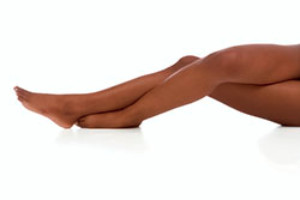 If you want to start taking care of your feet, the first step is to make sure you are wearing shoes that fit you properly. Wearing improper footwear can cause a lot of damage to your feet, and leave you in a lot of pain. If you are experiencing pain in your feet, you should be careful not to ignore it. A common source of foot pain is plantar fasciitis, but this condition can be avoided by stretching your feet and avoiding standing for long periods of time. Another tip you should follow if you want healthy feet is to get routine pedicures. Not only do pedicures help your feet feel more relaxed, but they also help them stay strong and healthy.
If you want to start taking care of your feet, the first step is to make sure you are wearing shoes that fit you properly. Wearing improper footwear can cause a lot of damage to your feet, and leave you in a lot of pain. If you are experiencing pain in your feet, you should be careful not to ignore it. A common source of foot pain is plantar fasciitis, but this condition can be avoided by stretching your feet and avoiding standing for long periods of time. Another tip you should follow if you want healthy feet is to get routine pedicures. Not only do pedicures help your feet feel more relaxed, but they also help them stay strong and healthy.
Everyday foot care is very important to prevent infection and other foot ailments. If you need your feet checked, contact one of our podiatrists from Carolina Foot & Ankle. Our doctors can provide the care you need to keep you pain-free and on your feet.
Everyday Foot Care
Often, people take care of their bodies, face and hair more so than they do for their feet. But the feet are a very important aspect of our bodies, and one that we should pay more attention to. Without our feet, we would not be able to perform most daily tasks.
It is best to check your feet regularly to make sure there are no new bruises or cuts that you may not have noticed before. For dry feet, moisturizer can easily be a remedy and can be applied as often as necessary to the affected areas. Wearing shoes that fit well can also help you maintain good foot health, as well as making it easier to walk and do daily activities without the stress or pain of ill-fitting shoes, high heels, or even flip flops. Wearing clean socks with closed shoes is important to ensure that sweat and bacteria do not accumulate within the shoe. Clean socks help to prevent Athlete’s foot, fungi problems, bad odors, and can absorb sweat.
If you have any questions please feel free to contact one of our offices located in Huntersville Office | 16419 Northcross Dr Suite A, Huntersville, NC 28078; Mooresvillle Office | 206 Joe Knox Avenue Suite D, Mooresville, NC 28117; and Mountain Island | 10310 Couloak Drive Suite 200, Charlotte, NC 28216 . We offer the newest diagnostic and treatment technologies for all your foot and ankle needs.
